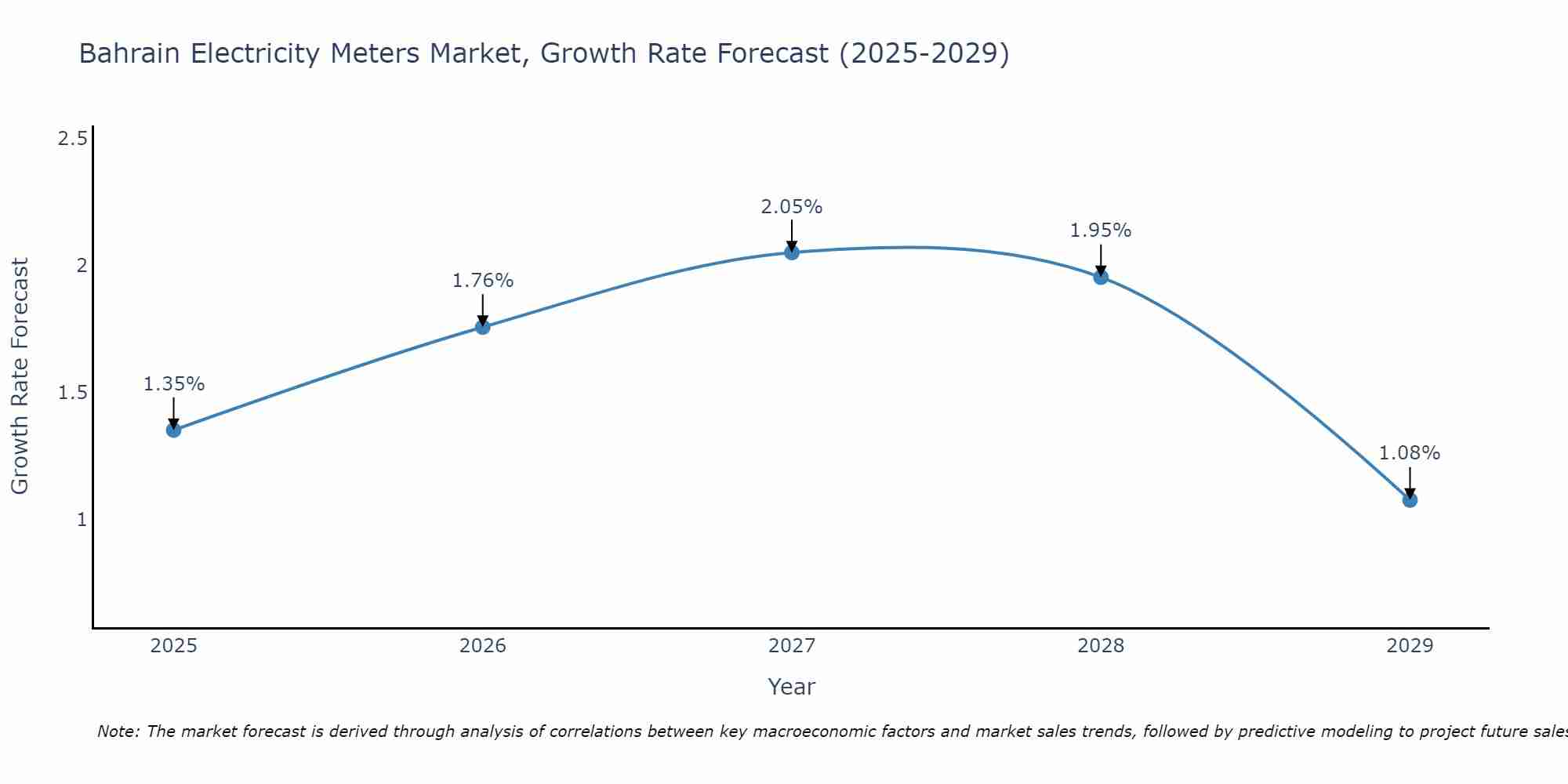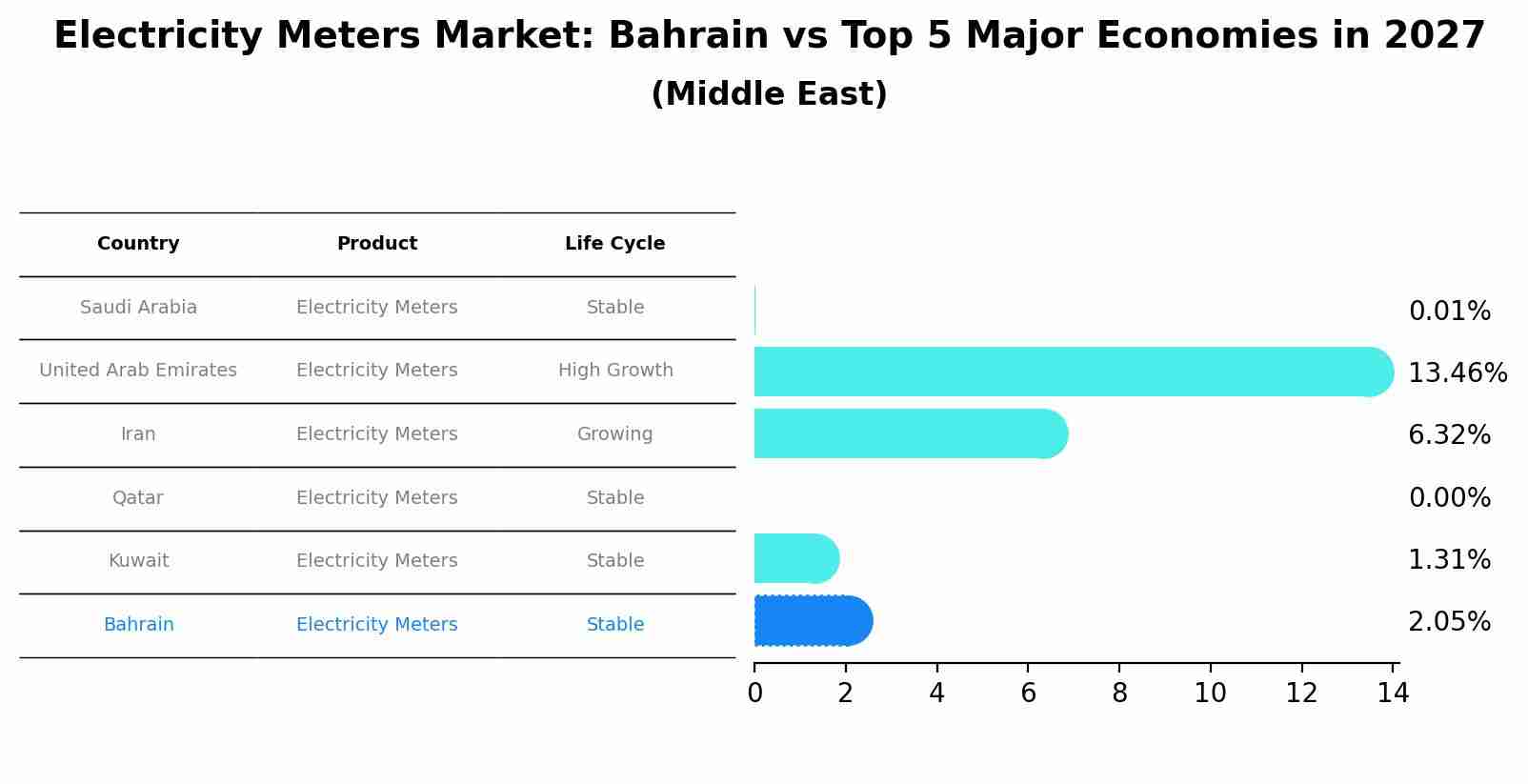Bahrain Electricity Meters Market Outlook | Trends, Forecast, Share, Growth, COVID-19 IMPACT, Industry, Size, Value, Analysis, Companies & Revenue
| Product Code: ETC432940 | Publication Date: Oct 2022 | Updated Date: Apr 2025 | Product Type: Market Research Report | |
| Publisher: 6Wresearch | Author: Dhaval Chaurasia | No. of Pages: 75 | No. of Figures: 35 | No. of Tables: 20 |
Bahrain Electricity Meters Market Size Growth Rate
The Bahrain Electricity Meters Market is projected to witness mixed growth rate patterns during 2025 to 2029. Growth accelerates to 2.05% in 2027, following an initial rate of 1.35%, before easing to 1.08% at the end of the period.

Electricity Meters Market: Bahrain vs Top 5 Major Economies in 2027 (Middle East)
Bahrain's Electricity Meters market is anticipated to experience a stable growth rate of 2.05% by 2027, reflecting trends observed in the largest economy Saudi Arabia, followed by United Arab Emirates, Iran, Qatar and Kuwait.

Bahrain Electricity Meters Market Synopsis
Electricity meters are essential for Bahrain`s power sector, aiding in accurate billing and energy monitoring. With the push toward smart grids and energy efficiency, smart electricity meters are gradually replacing traditional ones. The market is supported by public utility investments and digital infrastructure rollouts.
Trends of the market
Electricity meters in Bahrain are evolving rapidly with the nationwide adoption of smart grid technologies. Traditional electromechanical meters are being replaced by smart meters that offer real-time consumption tracking, remote disconnects, and integration with digital billing systems. The governments sustainability and energy efficiency goals are propelling installations across residential, commercial, and industrial sectors. International vendors dominate the supply chain, with installations managed through public-private partnerships. Interoperability, cybersecurity, and data privacy are key concerns in deployment. These meters are also contributing to better demand-side energy management and improved revenue assurance for utilities.
Challenges of the market
The electricity meters market in Bahrain is challenged by a slow transition from traditional to smart metering systems. High upfront installation costs deter mass deployment, especially in older residential and commercial buildings. The lack of digital infrastructure and integration capabilities hampers real-time monitoring and data management. Consumer awareness about the benefits of smart meters remains low. Furthermore, supply chain issues and a limited number of certified vendors add complexity to scaling efforts.
Investment opportunities in the Market
Bahrain`s focus on energy efficiency and infrastructure modernization is creating strong demand for smart electricity meters. These devices offer real-time consumption monitoring, enabling utilities and consumers to manage energy usage better. Investors can tap into opportunities for manufacturing or supplying advanced metering infrastructure (AMI), with features like remote data collection and load control. Collaborations with government energy authorities and participation in national smart grid initiatives can enhance market presence. The growing shift toward sustainable energy also makes this a timely investment avenue.
Government Policy of the market
Bahrain`s electricity meters market is strongly influenced by national smart grid initiatives led by the Electricity and Water Authority (EWA). The government is replacing traditional meters with advanced smart meters to support real-time monitoring, reduce power theft, and improve billing accuracy. Policies mandate the use of meters that conform to international standards like IEC and support interoperability with digital utility systems. Procurement for public utilities is centralized, ensuring vendor quality control and integration capabilities. Bahrain is also investing in IoT-based electricity meters and energy management systems as part of its sustainability goals. Regulatory support includes import facilitation for high-precision and smart energy monitoring equipment to aid the countrys renewable energy transition.
Key Highlights of the Report:
- Bahrain Electricity Meters Market Outlook
- Market Size of Bahrain Electricity Meters Market, 2021
- Forecast of Bahrain Electricity Meters Market, 2031
- Historical Data and Forecast of Bahrain Electricity Meters Revenues & Volume for the Period 2018 - 2031
- Bahrain Electricity Meters Market Trend Evolution
- Bahrain Electricity Meters Market Drivers and Challenges
- Bahrain Electricity Meters Price Trends
- Bahrain Electricity Meters Porter's Five Forces
- Bahrain Electricity Meters Industry Life Cycle
- Historical Data and Forecast of Bahrain Electricity Meters Market Revenues & Volume By Type for the Period 2018 - 2031
- Historical Data and Forecast of Bahrain Electricity Meters Market Revenues & Volume By Single Phase for the Period 2018 - 2031
- Historical Data and Forecast of Bahrain Electricity Meters Market Revenues & Volume By Three Phase for the Period 2018 - 2031
- Historical Data and Forecast of Bahrain Electricity Meters Market Revenues & Volume By Analog for the Period 2018 - 2031
- Historical Data and Forecast of Bahrain Electricity Meters Market Revenues & Volume By Smart for the Period 2018 - 2031
- Historical Data and Forecast of Bahrain Electricity Meters Market Revenues & Volume By Application for the Period 2018 - 2031
- Historical Data and Forecast of Bahrain Electricity Meters Market Revenues & Volume By Residential for the Period 2018 - 2031
- Historical Data and Forecast of Bahrain Electricity Meters Market Revenues & Volume By Commercial for the Period 2018 - 2031
- Historical Data and Forecast of Bahrain Electricity Meters Market Revenues & Volume By Industrial for the Period 2018 - 2031
- Historical Data and Forecast of Bahrain Electricity Meters Market Revenues & Volume By Others for the Period 2018 - 2031
- Bahrain Electricity Meters Import Export Trade Statistics
- Market Opportunity Assessment By Type
- Market Opportunity Assessment By Application
- Bahrain Electricity Meters Top Companies Market Share
- Bahrain Electricity Meters Competitive Benchmarking By Technical and Operational Parameters
- Bahrain Electricity Meters Company Profiles
- Bahrain Electricity Meters Key Strategic Recommendations
Frequently Asked Questions About the Market Study (FAQs):
- Single User License$ 1,995
- Department License$ 2,400
- Site License$ 3,120
- Global License$ 3,795
Search
Thought Leadership and Analyst Meet
Our Clients
Related Reports
- Afghanistan Rocking Chairs And Adirondack Chairs Market (2026-2032) | Size & Revenue, Competitive Landscape, Share, Segmentation, Industry, Value, Outlook, Analysis, Trends, Growth, Forecast, Companies
- Afghanistan Apparel Market (2026-2032) | Growth, Outlook, Industry, Segmentation, Forecast, Size, Companies, Trends, Value, Share, Analysis & Revenue
- Canada Oil and Gas Market (2026-2032) | Share, Segmentation, Value, Industry, Trends, Forecast, Analysis, Size & Revenue, Growth, Competitive Landscape, Outlook, Companies
- Germany Breakfast Food Market (2026-2032) | Industry, Share, Growth, Size, Companies, Value, Analysis, Revenue, Trends, Forecast & Outlook
- Australia Briquette Market (2025-2031) | Growth, Size, Revenue, Forecast, Analysis, Trends, Value, Share, Industry & Companies
- Vietnam System Integrator Market (2025-2031) | Size, Companies, Analysis, Industry, Value, Forecast, Growth, Trends, Revenue & Share
- ASEAN and Thailand Brain Health Supplements Market (2025-2031) | Strategy, Consumer Insights, Analysis, Investment Trends, Opportunities, Growth, Size, Share, Industry, Revenue, Segments, Value, Segmentation, Supply, Forecast, Restraints, Outlook, Competition, Drivers, Trends, Demand, Pricing Analysis, Competitive, Strategic Insights, Companies, Challenges
- ASEAN Bearings Market (2025-2031) | Strategy, Consumer Insights, Analysis, Investment Trends, Opportunities, Growth, Size, Share, Industry, Revenue, Segments, Value, Segmentation, Supply, Forecast, Restraints, Outlook, Competition, Drivers, Trends, Demand, Pricing Analysis, Competitive, Strategic Insights, Companies, Challenges
- Europe Flooring Market (2025-2031) | Outlook, Share, Industry, Trends, Forecast, Companies, Revenue, Size, Analysis, Growth & Value
- Saudi Arabia Manlift Market (2025-2031) | Outlook, Size, Growth, Trends, Companies, Industry, Revenue, Value, Share, Forecast & Analysis
Industry Events and Analyst Meet
Whitepaper
- Middle East & Africa Commercial Security Market Click here to view more.
- Middle East & Africa Fire Safety Systems & Equipment Market Click here to view more.
- GCC Drone Market Click here to view more.
- Middle East Lighting Fixture Market Click here to view more.
- GCC Physical & Perimeter Security Market Click here to view more.
6WResearch In News
- Doha a strategic location for EV manufacturing hub: IPA Qatar
- Demand for luxury TVs surging in the GCC, says Samsung
- Empowering Growth: The Thriving Journey of Bangladesh’s Cable Industry
- Demand for luxury TVs surging in the GCC, says Samsung
- Video call with a traditional healer? Once unthinkable, it’s now common in South Africa
- Intelligent Buildings To Smooth GCC’s Path To Net Zero


















